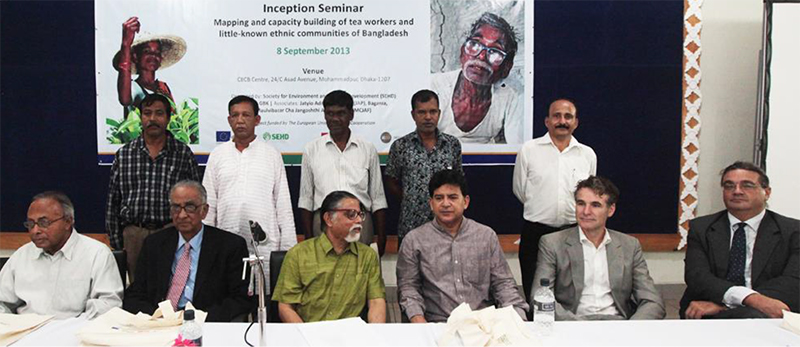
Inception Seminar
“Many ethnic communities of Bangladesh are constitutionally and statistically invisible.”
– Dr. Hossain Zillur Rahman
Dr. Hossain Zillur Rahman, executive chairman, Power and Participation Research Centre (PPRC) said that many of the ethnic communities of Bangladesh are invisible, both constitutionally and statistically. “This invisibility must be dispelled so that they can raise their voices and claim their rights,” he suggested in a day-long inception seminar on “Mapping and capacity building of tea workers and little-known ethnic communities of Bangladesh” organised by The Society for Environment and Human Development (SEHD) in Dhaka on 8 September 2013.
Information and insights about the condition of the tea plantation workers in ‘tied’ situation and little-known ethnic communities of Bangladesh were shared at the seminar.
Justice Muhammad Habibur Rahman was present at the event as the chief guest. Chaired by Prof. Sakhawat Ali Khan, chairman of SEHD, the special guests and commentators were Philippe JACQUES, the head of cooperation, European Union Delegation to Bangladesh; Prof. Rafiqul Islam, professor emeritus, ULAB; Dr. Hossain Zillur Rahman, executive chairman, Power and Participation Research Centre (PPRC); and Leonard Zilstra, country representative, ICCO Cooperation, Bangladesh Office.
In his chief guest’s speech Justice Habibur Rahman said, “There are a good number of communities in Bangladesh who do not call themselves Bangalis; without knowing them, we cannot develop their communities. And without their development, Bangladesh cannot be developed.” He applauded SEHD’s initiative to make these ethnic communities known to the majority people.
Philippe JACQUES appreciated the initiative saying, “The project has an exciting approach as it combines action research and capacity building. All of us are going to learn a lot during the implementation.” He hoped that the living conditions of these deprived communities would become more humane as a result of this initiative.
In his welcome speech Philip Gain, general secretary of SEHD, said that a tea worker in neighbouring Sri Lanka gets Rs 550 per day while their Bangladeshi counterparts receive only BDT 69. Three years back, the daily wage was a meagre 32.50 BDT. He also described the miseries of little known-ethnic communities of Bangladesh as people of more than 50 communities are deprived of education and access to land. “To protect the rights, fundamental freedom and political representation, we have to raise consciousness of all,” he added.
Representatives from some 45 communities among others including academics, researchers, development activists and journalists participated in the seminar to share their reflections on how to develop useful tools for study and capacity building of communities and their organizations.
The tea plantation workers and their communities in “tied” situation in the labour lines of the tea gardens are one of the most marginalized and excluded groups of people of Bangladesh. Descendants of the indentured plantation labour force and isolated from the majority community they remain largely unrepresented in democratic and political processes. Among the ethnic communities living in the plains and even some in the CHT there are as many as 60 groups that are little-known or invisible to the majority community and also to the outside world. Capability deprivation of these communities makes their sufferings and the structural abuses generational.
“Mapping and capacity building of tea plantation workers and little-known ethnic communities of Bangladesh” is a 3 years project supported by the European Union and ICCO Cooperation (Netherlands) that has started in May 2013 to clearly identity the tea workers and the little-known ethnic communities, raise their issues, and build their capacity.
[PDF version DOWNLOAD]
Writer is research and documentation officer, Society for Environment and Human Development (SEHD).
Repot by Md. Ashraful Haque
First Published: Dhaka Courier, 12 September 2013




